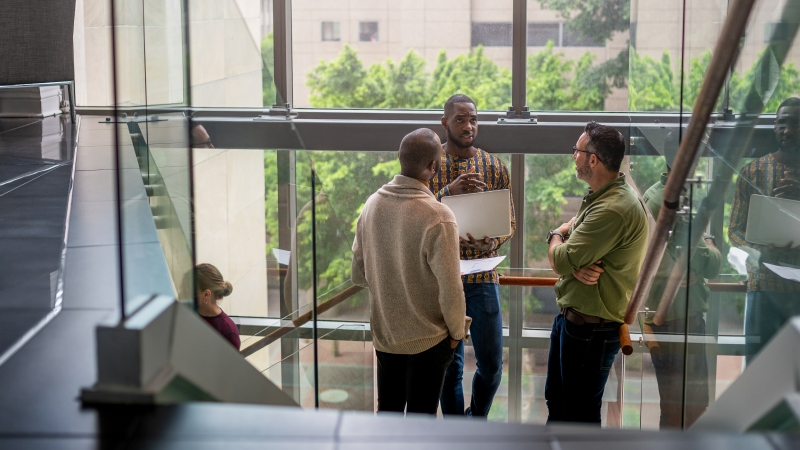Why watercooler moments matter even more in 2021

During a typical pre-pandemic working day how many social interactions do you think you had on average in the workplace? Where did these take place?
Now think about the number of social interactions you had today with co-workers and where they took place. Do you notice a difference?
The physical workplace is an essential facilitator for socialising. The stairs, the kitchen, the watercooler, and the snack bar are all informal meeting points where people can come together.
Since the pandemic, the number of interactions has on average halved and reduced the variety of social interactions for 67% of UK workers. A further 49% report having effectively lost contact with colleagues they would usually speak to on a regular basis.
Back-to-back video calls may have kept the wheels of business turning, but it’s had a negative impact on employee wellbeing. In addition to ‘Zoom fatigue’, lack of social interaction has impacted on people’s sleep, productivity, creativity, and problem-solving abilities.
This is because humans are wired to be social. We derive many health benefits from regular social interaction.
Meeting a work friend in the corridor between meetings can put a spring in your step because it activates parts of the brain connected with happiness and reward.
When we experience positive relationships, chemicals like dopamine and endorphins are released into the body making us feel good. Socialising is said to even improve our overall health.
According to Positive Psychology, “when employees experience positive relationships, the body’s ability to build, maintain, and repair itself is improved both in the workplace and in non-work related leisure and resting times.”
The good news is that more people are returning to the physical office, at least for some of the time. But before you discourage idle watercooler chit chat, consider the following five benefits to socialising in the workplace.
1. Improved employee engagement and loyalty
Engaged employees are more likely to stay with an organisation and to go above and beyond to surpass expectations. Global analytics firm Gallup says their research has consistently shown a link between having friends in the workplace and the amount of effort put in at work.
For example: “Women who strongly agree they have a best friend at work are more than twice as likely to be engaged (63%) compared with the women who say otherwise (29%).”
Increased employee engagement has many benefits. According to Gallup these include higher productivity, higher customer loyalty/ engagement, better safety, lower turnover and higher profitability.
2. Fuel for innovative thinking
Modern offices are designed with collaboration in mind, but not all new ideas come from formal meetings in designated spaces. Frequent social interactions, such as bumping into someone in the kitchen, also provide opportunity for new ideas or even stand-out innovations.
Furthermore, Positive Psychology says frequent social interactions with co-workers result in stronger within-group ties. These “assist innovators in the search for inspiration, sponsorship, and support within the workplace”.
3. Boosts productivity
It seems counter-intuitive that gossiping at the watercooler should aid productivity. But amongst the general catching up on TV shows, kids, pets, and holidays is conversation around work problems, customers, and career paths.
The Microsoft Work Trend Index found that people who said they felt more productive also reported stronger workplace relationships than those who didn’t.
4. Facilitates knowledge sharing
How do you know what happened in that meeting you weren’t in? You find out about it from a colleague in the lift or on the stairs.
Impromptu catch ups are important for ensuring everyone is on the same page. Social interactions are also important for supporting colleagues with knowledge, mentoring, and emotional support.
Harvard Business Review says social capital “helps knowledge and information flow. It spurs new ideas and energizes our thinking”.
5. Contributes to happiness
Quality relationships are fuel for happiness, which is essential for a person’s all-round wellbeing. “Strong social connections make people happier and physically healthier, which can translate into work performance,” says Forbes.
Rediscover the fizz that gives your workplace its sparkle
It may be work that brings us together but it’s in the human-to-human, in-person interaction that unites us.
If like us, you’ve missed the buzz of being together in a physical space, gather at the watercooler and raise a glass of chilled sparkling water in celebration of your work friends.



